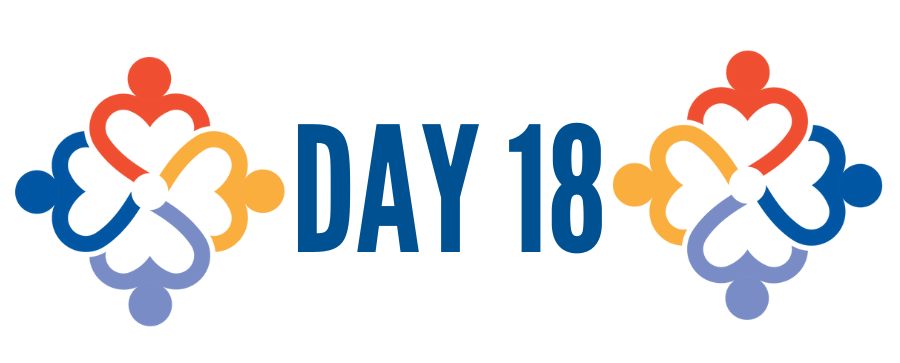
Day 18: Creating inclusive spaces – allyship
What does it mean to be an ally? An ally is someone who does not belong to an oppressed group but works to actively advocate with and for that group. To do this well, allies work to understand what it feels like for another person or group to be oppressed, and despite knowing you will never fully understand how it feels, is committed to valuing and supporting people who are marginalized. Remember, being an ally is not an identity, it is a continual process – something that you have to work at, be intentional about, and commit to, day in and day out.
In a starter guide, Amélie Lamont summarizes what it means to be an ally:
- Take on the struggle as your own.
- Transfer the benefits of your privilege to those who lack it.
- Amplify the voices of the oppressed before your own.
- Acknowledge that even though you feel pain, the conversation is not about you.
- Speak up, even when you feel scared.
- Own your mistakes and de-center yourself.
- Understand that your education is up to you and no one else.
You have taken on so many of these steps already participating in the 21-Day Equity Challenge. Now the important work continues with you. How will you work to be an ally? To whom?
Today’s Challenge
Read:
The work of allyship Guide to Allyship [15 min read] The Do’s and Don’ts of Allyship are important to know as you practice and evolve your role in fighting for equity. Explore the dos and don’ts you have engaged in as an ally (or experienced from an ally) in support of equity and inclusion.
Allyship – The key to unlocking the power of diversity by Sheree Atcheson (Nov 2018) [7 min read] So you want to be a better ally in the workplace but don’t know where to start? This article will share concrete steps and concepts to start your journey.
Watch:
Four Ways To Be A True BLM Ally The Representation Project [47 min watch] This webinar focuses on what organizations can do to move beyond just striving for diversity on their teams. As part of the conversation, the panelists discuss the difference between people who take part in optical (or performative) allyship and those who are true allies calling for change. Coined by Latham Thomas, optical allyship is “allyship that only serves at the surface level to platform the ‘ally,’ it makes a statement but doesn’t go beneath the surface and is not aimed at breaking away from the systems of power that oppress.”
Listen:
Safety-Pin Solidarity: With Allies, Who Benefits? Code Switch (Mar 2017) [31 min watch] Does wearing safety pins and giving speeches at awards shows make you an ally? On this episode we explore the conundrums of ally-ship with activist and blogger ShiShi Rose, who helped organize the Women’s March, Taz Ahmed, co-host of the GoodMuslimBadMuslim podcast, the Reverend Timothy Murphy, and our editor, Juleyka Lantigua-Williams. We also talk with the co-founder of a black-owned company that teaches white people how to be better allies, for a fee.
From Unaware to Accomplice: The Ally Continuum by Jennifer Brown (Jul 2018) [30 min listen; 16 min transcript read available, too] Join Jennifer Brown for a mini podcast episode as she shares the 4 steps of the ally continuum, and what it takes to move from one step to the next, from being unaware to being an accomplice. Explore where you are along the continuum and how to get to where you want to be.
Discuss:
- By definition, an ally is someone who makes the commitment and effort to recognize their privilege (based on gender, class, race, sexual orientation, ability, etc.) and works in solidarity with oppressed groups in the struggle for justice. Allies understand that it is in their own interest to end all forms of oppression, even those from which they may benefit in concrete ways. Where are you on your journey to living as an ally to members of oppressed communities?
- Where can you use your influence to elevate the voices of members of these communities?
- Where do you hear and see bias in your own community?
- How can you help disrupt these narratives or norms with the knowledge you’ve gained? What questions can you ask to approach from a place of curiosity?
